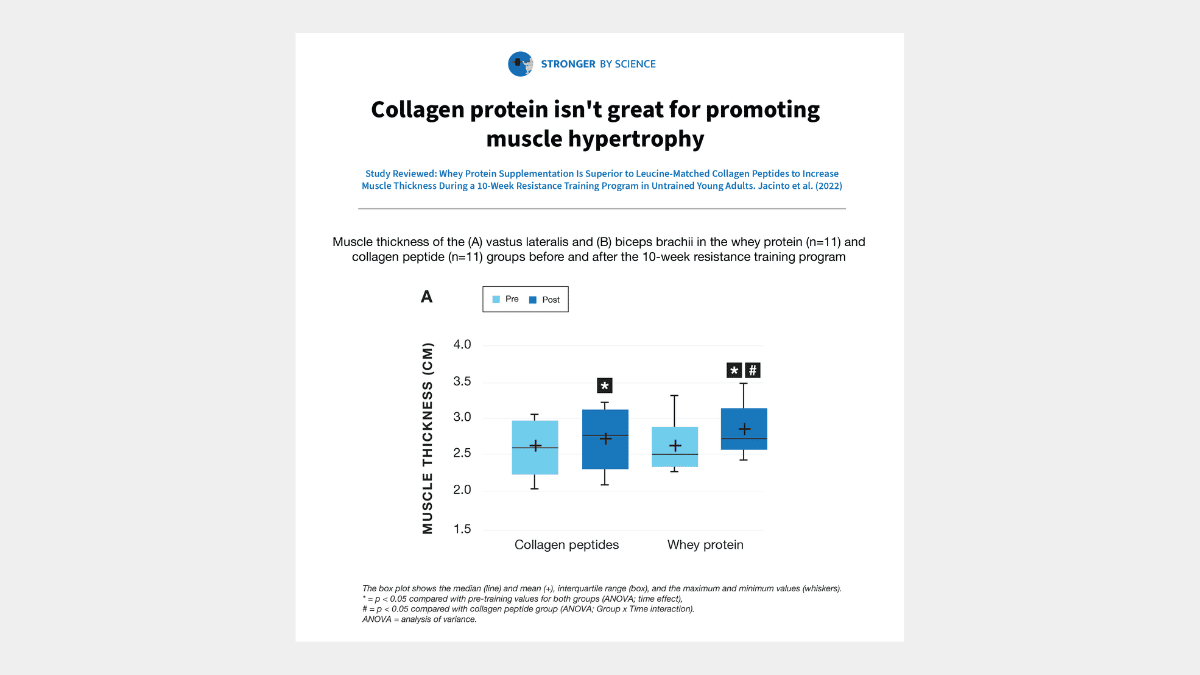Protein quality has received a lot of attention in recent issues of MASS Research Review, and for good reason – a number of applied studies have challenged some mechanistically driven assumptions about how a protein source’s amino acid profile and overall quality score might impact its ability to support hypertrophy. This conversation often involves comparing a lower-quality plant-based protein to a higher-quality animal-based protein, and recent studies have suggested that plant-based proteins can effectively support hypertrophy when total protein intake is ≥1.6g/kg/day (2). This is not because 1.6 is a magic number and ensures optimal gains. Rather, we see that lower-quality proteins tend to be somewhat “inefficient” protein sources but often have complementary amino acid coverage, so their suitability (in terms of maximally supporting hypertrophy) depends on total protein intake. When total protein intake is high, the efficiency of each individual protein source becomes less relevant, but when total protein intake gets lower and lower, efficiency becomes increasingly important.
It’s important to recognize, however, that the protein quality conversation isn’t always about comparing plant sources to animal sources. Collagen is a fairly popular animal-based protein, but it has a very low protein quality score (zero, in fact). Collagen has a very atypical amino acid profile; it lacks tryptophan entirely (hence the protein quality score of zero) and several other essential amino acids, but has very high amounts of glycine, proline, hydroxyproline, and hydroxylysine. Its amino acid profile is very conducive to collagen synthesis, which could theoretically be good for bones, tendons, and other connective tissues. In contrast, its amino acid profile is pretty awful for supporting hypertrophy, with relatively low amounts of important essential amino acids such as leucine, isoleucine, valine, lysine, methionine, and threonine.
The amino acid shortcomings of collagen are quite a bit different than the amino acid situation for most plant-based proteins. If you check out this open-access review by Van Vliet and colleagues (3), you can compare amino acid quantities of various plant-based and animal-based proteins. You’ll find that plant-based options tend to be a little lower in leucine (but not outrageously so), and will tend to lack one or two essential amino acids, with a relative abundance of others. For example, you can match a protein like lentils (low methionine, high lysine) with a protein like rice (high methionine, low lysine), and end up with a pretty comprehensive overall amino acid profile. In contrast, the widespread amino acid shortcomings of collagen could potentially be a little more difficult to rectify. Despite those numerous amino acid shortfalls, the research assessing collagen’s impact on longitudinal changes in fat-free mass is mixed, with a surprising number of studies reporting increases (4).
To further explore collagen’s potential for supporting hypertrophy and gains in fat-free mass, the presently reviewed study (1) compared post-workout supplementation with 35 grams of whey protein to 35 grams of leucine-enriched collagen over the course of a 10-week resistance training program. Both supplements contained 35 grams of total protein and 3 grams of leucine, which required that an extra 2 grams of leucine be added to the collagen supplement. The protein supplements provided about 0.5g/kg/day of protein, which was consumed on top of participants’ habitual protein intake (which was around 1.1-1.5 g/kg/day, on average). Supervised training sessions occurred three days per week, and supplements were consumed in the evening on non-training days. The program consisted of full-body workouts with multiple sets per exercise and repetitions in the 8-12 per set range, and loads were adjusted weekly to ensure that the program was progressive in nature. 18 healthy young adults (aged 18 to 35) were randomly assigned to each group, but only 11 participants (8 men and 3 women) from each group were able to finish the entire study with suitable adherence.
In terms of study outcomes, the researchers were primarily interested in assessing changes in training load, isokinetic elbow flexor strength and power, lower-body peak power (measured via countermovement jump), and muscle thickness of the vastus lateralis and biceps brachii (measured via ultrasound). There were no statistically significant differences between groups in terms of training load, lower-body peak power, or isokinetic elbow flexor strength or power. However, the whey group experienced significantly larger increases in vastus lateralis and biceps brachii muscle thickness than the collagen group (Figure 1). The whey group experienced Cohen’s d effect sizes of 0.68 and 0.61 for increases in vastus lateralis and biceps brachii thickness, whereas the collagen group experienced effect sizes of only 0.38 and 0.35, respectively.

Overall, these results aren’t entirely surprising. As discussed by the authors of the present study (1), there are some studies reporting increases in fat-free mass following collagen supplementation, but the only study that directly measured muscle hypertrophy found no significant effect of collagen supplementation on muscle growth. Additionally, although we shouldn’t assume that acute muscle protein synthesis rates are perfectly indicative of hypertrophic potential, there is direct research showing that that collagen has underwhelming effects on acute muscle protein synthesis (5), thereby linking the acute, mechanistic findings to the longitudinal, applied findings.
An interesting observation in the presently reviewed study is that non-supplement protein intake fell over time in the collagen group, and was a bit lower than the whey group. Diet logs were analyzed at baseline, along with weeks 3, 7, and 10. The collagen group started around 1.5g/kg/day, and steadily dropped to 1.2g/kg/day in week 7, and eventually to 1.1g/kg/day in week 10. In contrast, the whey group consumed 1.4g/kg/day at all time points except for week 3 (1.1g/kg/day). A reasonably consistent finding in the literature comparing plant and animal proteins is that plant-based proteins tend to do fine, as long as total protein intake is ≥1.6g/kg/day. In the present study, the leucine-enriched collagen should have pushed the collagen group to or above that threshold (1.1-1.5 g/kg/day of protein from food, plus 0.5g/kg/day of protein from the collagen supplement). So, it would appear that this general rule tends to hold true for diets composed of typical plant proteins (which tend to have reasonably adequate and complementary amino acid profiles), but collagen’s amino acid profile is too flawed for this guideline to apply (even after leucine fortification). Again, this shouldn’t be a total surprise, given that collagen’s amino acid problems extend far beyond leucine alone.
So, if you’re focused on hypertrophy and thinking about replacing some moderate- or high-quality dietary proteins with collagen supplements, you’ll want to rethink that strategy. I generally don’t advocate for convoluted protein-counting strategies (for example, counting only high-quality protein sources toward your daily protein total, or counting low- or moderate-quality proteins in a fractional manner), and I won’t start now. However, I would advise hypertrophy-focused readers against consuming a considerable portion of daily protein from collagen, and if a significant dose of collagen (for example, >15g/day) is part of your daily routine, you might want to double check to ensure that your total daily protein intake is at least in the range of 1.7-1.8 g/kg/day. I’ve previously described some plant-based proteins as being “inefficient” for promoting hypertrophy (when scaled relative to caloric content or total protein content), but this becomes less important when total protein intake meets or exceeds 1.6g/kg/day. Collagen happens to be very, very inefficient, so you’ll probably want to be at or above the 1.7-1.8 g/kg/day range to ensure that this inefficiency isn’t hindering muscle growth. To be clear, that range is not empirically derived, and is a bit speculative. You could argue about the exact total protein number that needs to be reached, but the general point is that you don’t want to be replacing a lot of high-quality or moderate-quality proteins with collagen if you’re near the lower end of the optimal protein range.
You might be wondering why people would bother with collagen supplementation in the first place. As I reviewed in a previous MASS article, there is some evidence to suggest that collagen supplementation can facilitate collagen synthesis and may be beneficial for individuals with joint pain or other issues related to connective tissues. This body of research is small, and it’s not universally embraced by sports nutrition experts, but there is at least some evidence linking collagen supplementation to increased rates of collagen synthesis, increased fat-free mass (presumably via increased connective tissue mass), and attenuation of joint pain.
I’m not a connective tissue expert, so take this with a grain of salt, but I’m personally not sure that collagen supplementation would be my first course of action if I was dealing with a connective tissue injury that needed some nutritional support. I think you can make a strong argument that the glycine content is most likely driving the effects of collagen supplementation (6), and as a fringe benefit, there’s also evidence linking glycine to better sleep (7). Kidney stones don’t seem to be a notable issue in the longitudinal studies on collagen supplementation, but it’s worth noting that collagen is rich in hydroxyproline, which could theoretically increase the likelihood of kidney stones (8). As such, aiming for 3-5g of glycine might be a suitable alternative to taking 10-15g of collagen. So, in summary, there is some evidence linking collagen supplementation to modest benefits related to connective tissues and joints, but it’s quite possible that a little bit of glycine would do the trick. Either way, you don’t want to rely heavily on collagen for the promotion of muscle hypertrophy, and if you happen to consume a substantial amount of collagen, you’ll want to make sure you’re taking necessary steps to achieve adequate and comprehensive essential amino acid intake.




